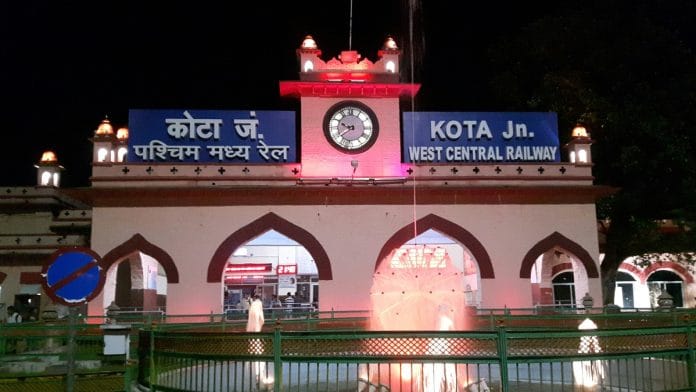Thank you dear subscribers, we are overwhelmed with your response.
Your Turn is a unique section from ThePrint featuring points of view from its subscribers. If you are a subscriber, have a point of view, please send it to us. If not, do subscribe here: https://englishdev.theprint.in/subscribe/
In a remote Indian village, the story of a young boy, whose dreams stretched as wide as the open skies, once inspired hope. Fuelled by unwavering determination to become an engineer and escape the confines of his small village, he embarked on a journey to Kota, the hub of coaching centers for engineering entrance exams. Little did he know that this path would lead him into a dark web of mental pressure, depression, and loneliness.
Kota, renowned for its coaching centers, has lately garnered notoriety for a far more sinister reason: it has witnessed the tragic suicides of 25 students in 2023 alone. The young dreamer, like so many others, found himself ensnared in the relentless academic grind, surrounded by students pushed to their limits.
The recent loss of a 17-year-old student has amplified the alarm bells in Kota, highlighting the dire need for mental health reforms in India’s educational system. The pressure here is suffocating, a place where expectations weigh relentlessly, driving the desire to succeed into the abyss of despair.
The story of this young boy is not isolated; it’s emblematic of a national crisis. The National Crime Records Bureau reports a staggering 864 out of 10,732 suicides attributed to “failure in examination.” These aren’t just numbers; they are lives extinguished, dreams shattered, and families left in anguish.
This crisis is not solely the fault of the students; it reflects a society that places an unbearable burden on their young shoulders. Parents, well-intentioned but often misguided, impose unattainable expectations on their children, believing that a single exam outcome defines their entire future.
With the recent pronouncement of the Supreme Court by the division bench of Justices Sanjiv Khanna and SVN Bhatti, a noteworthy perspective emerges on the issue of student suicides in Kota. Contrary to attributing blame to coaching institutes, the court contends that it is the undue pressure exerted by parents in the intensely competitive academic environment that culminates in tragic outcomes. The court astutely notes that suicides are not a direct consequence of coaching institutes but rather stem from the inability of children to meet the lofty expectations set by their parents.
In essence, the court’s observation underscores a critical shift in the narrative surrounding student suicides, emphasizing the need to scrutinize the expectations placed on students in the context of cutthroat examinations. The competitive nature of exams, coupled with the weight of parental expectations, creates a volatile concoction that adversely affects the mental well-being of students. The court aptly points out that the margin of success has become exceedingly slim, with students grappling to meet the stringent standards set by the academic landscape.
This perspective prompts a crucial examination of the prevailing academic culture and the societal expectations placed on students. It raises questions about the toll that intense competition and parental pressure take on the mental health of young individuals striving to excel in their studies. As the court contends, a nuanced understanding of the root causes of student suicides is imperative to implement effective measures that address the underlying issues, ultimately fostering a healthier and more supportive educational environment.
Drawing parallels with these observations, the critically acclaimed web series Kota Factory provides a poignant portrayal of the intricate challenges faced by students in Kota. Much like the court’s assertion that coaching institutes are not solely responsible for student suicides, Kota Factory delves into the multifaceted aspects of the constrictive academic environment prevailing in coaching hubs.
Moreover, Kota Factory sheds light on the stifling nature of the educational system, where creativity often takes a backseat to rote learning and exam-centric approaches. The limited scope for creative expression and the overwhelming pressure to conform to rigid academic standards align with the court’s recognition of the challenges students face in meeting stringent expectations.
By acknowledging the complexities portrayed in Kota Factory, society can better understand the nuanced dynamics at play and work towards fostering an educational ecosystem that nurtures both academic excellence and the well-being of students. The solution lies in collective action. Parents must be sensitized to the consequences of their expectations, realizing that their child’s worth transcends a test score. Educational institutions must prioritize mental health with regular awareness programs and on-campus support from certified professionals. The education system itself needs reform, shifting focus from grades to holistic evaluation.
The young boy’s story is a stark reminder that the time for change is now. Our students’ mental well-being hinges on it. As India’s New Education Policy makes strides toward incorporating mental health support, and the World Health Organization emphasizes mental health as a universal human right, we must unite in our efforts. Each conversation, each initiative, can be a step toward nurturing a generation of resilient individuals who understand that their worth goes far beyond a single exam score. The bright stars of our nation deserve a chance to shine without being dimmed by the weight of unrealistic expectations.
These pieces are being published as they have been received – they have not been edited/fact-checked by ThePrint.


